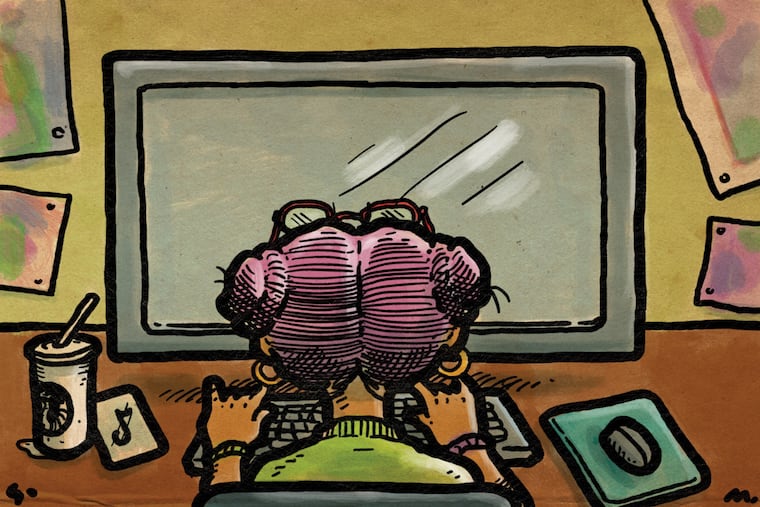81% of Gen Z believe they can write self-help books
Baby Boomers, on the other hand, not so much

It takes audacity to write a self-help book.
What you’re proclaiming, page after page, is not only that you have a better take on what’s plaguing the human condition than everyone else, you’re also saying that you’re enlightened enough to fix it.
That’s chutzpah.
Now comes a new survey that says 47% of Americans believe they could write a self-help (also called self-improvement) book.
What’s more, 81% of Gen Z folks (ages 12 to 27) are confident they could pen such a tome, compared to 48% of millennials (ages 28 to 43), and just 28% of boomers (ages 60 to 78). The survey was conducted last fall by OnePoll, a market research company.
The inference, various observers say, is that the longer you live, the less wisdom you believe you have to impart. Conversely, the younger you are, the more you have to say about how to conduct a life.
“That’s hilarious,” said Eve Robbins, 68, who works in logistics at a kitchen design and supply company in Center City. “People are such geniuses. They have such high opinions of themselves and how they do everything.
“But I’m cautious about giving advice. As you age, you learn that you don’t know as much as you thought you knew.
“Maybe Gen Z is so confident because their egos haven’t been punctured yet. And they don’t know what they don’t know.”
What Gen Z does understand is how to be in touch with their emotions, said Charlie Huemmler, 25, of Brewerytown. “Gen Z has a bigger emotional vocabulary because we’re taught to speak through our emotions,” said Huemmler, currently seeking a job in city planning. “We’ve learned a therapeutic style of communication.”
Anna Nicholaides, a Center City psychologist, agreed that “there’s been a big push for mental health awareness with younger generations.” She added, “A lot more young people are having therapy. They also have a lot of confidence, whereas aging boomers have more humility.
“But I don’t know if that means young people can write self-help books.”
Actually, having lived just a quarter-century hasn’t stymied some self-help authors, most notably Texas writer Keila Shaheen, who published her best-seller, The Shadow Work Journal, a mental health guide, last year at age 24.
Many people learned about her on TikTok. Social media pounds out powerful how-to/self-help messaging, said Delaney Mullen, 23, a kitchen designer.
“I definitely don’t have a self-help book in me now,” she said. “But there are a lot of women my age thinking they can give advice because they’re on social media: Eat this for breakfast, do this on a run, fold your laundry this way.”
And it’s a lot easier for Gen Z people to take advice from young people, said Katie Barone, 22, of South Philadelphia, who does cancer research for Lankenau Institute for Medical Research.
“It’s different from the past where guidance came from parents and grandparents,” she added. “I think people learn more from their peers, which is a little backwards.”
Self-help sells
It seems that no matter who’s giving advice, self-help books sell.
The pandemic helped boost appetite for the books, as people had more time to sit home and contemplate how to better manage their lives, according to Marketdata, a research company. The sales of self-help books grew by 9% between 2021 and 2022 to $708 million, company figures show.
Lots of self-help thinking emanates from Philadelphia.
Martin Seligman, one of the best-known self-improvement authors in the United States, is the director of the University of Pennsylvania Positive Psychology Center. He’s written around 30 self-help books and more than 350 articles about the science of what makes life worth living, according to the PositivePsychology.com blog.
His better-known works include What You Can Change & What You Can’t (The Complete Guide to Successful Self-Improvement), and Learned Optimism: How to Change Your Mind and Your Life.
Neither Seligman or other center faculty members were available to comment.
Other recently published local authors in the genre include Felecia Burton, 56, who splits her time between North Philadelphia and Atlanta.
She wrote The Three C’s: How I Survived Crack, Cancer and Covid-19: My Memoir, Your Self-Help Tools (2020). Also known as Doc B, Burton said it was her “confidence and spirituality” that propelled her to write. “I’ve got to tell people how I got through it all,” she said.
Finding such certitude to deliver her own self-help book was not easy for Caroline Wiseblood Meline, 82, of Germantown, author of The Constant Dieter: A Philosopher’s Guide to Conquering Chronic and Compulsive Overeating (2023). She’d conquered an eating disorder 40 years ago but didn’t think she was qualified to produce a self-help book until she’d studied her subject, then herself, then psychology and philosophy.
“I couldn’t write the book until I’d gotten into the topic sufficiently to convince myself it wasn’t just sheer ego powering me to write,” she said.
As ubiquitous as self-help books have become, regardless of which generation is authoring them, one constant stands out, according to Nicholaides, the Center City psychologist:
“I don’t think self-help books are all that helpful,” she said, “because if they were, I’d be out of business.”